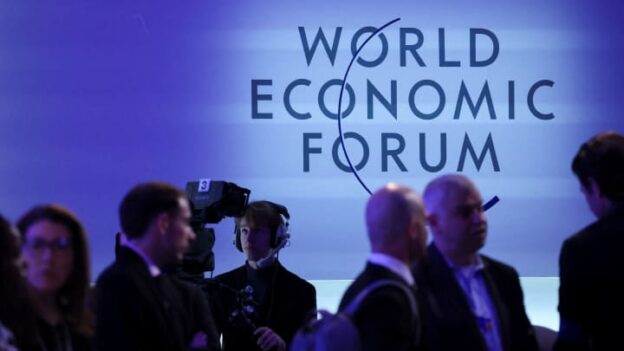- The 2025 Annual Meeting of the World Economic Forum is taking place from 20-24 January in Davos, Switzerland.
- Davos 2025 convenes under the theme of “Collaboration for the Intelligent Age.”
- Hundreds of public figures, including scores of heads of state and government, are gathering for the event.
Amid ongoing conflict, economic uncertainty and rapid technological advancements, heads of state are gathering in Davos, Switzerland, for the World Economic Forum’s Annual Meeting 2025.
The summit, taking place from 20 -25 January 2025, is being held under the theme of “Collaboration for the Intelligent Age” and is welcoming close to 3,000 attendees from over 130 countries. Participants include over 50 heads of state and government and hundreds of other top governmental leaders.
The gathering comes as uncertainty looms large over the international system, with new leaders coming into office and conflict persisting in multiple regions. In Davos, world leaders as well as top private sector voices and leading civil society experts are meeting to drive dialogue and catalyse durable solutions to shared challenges.
Many of the world leaders—including President of the United States Donald Trump, Vice-Premier of the People’s Republic of China Ding Xuexiang, President of the European Commission Ursula von der Leyen and President of Argentina Javier Milei, to name a few—are delivering addresses and participating in public dialogues.
Here’s what they are saying.
Ursula von der Leyen, President of the European Commission
President of the European Commission Ursula von der Leyen delivered a special address during the opening ceremony of the Annual Meeting. “The world today is still nearly as connected as ever,” she stated. “But it has also started fracturing along new lines.”
Von der Leyen urged private and public sector leaders working together, noting that it is in “no one’s interest to break the bonds of the global economy.”
Ding Xuexiang, Vice-Premier of the People’s Republic of China
In a special address, Chinese Vice-Premier Vice-Premier Ding Xuexiang called on governments to uphold the institutions of multilateralism and warned against the increasing use of protectionist polices. “Trade wars have no winners,” he stated.
“We need to jointly uphold and practice true multilateralism,” Ding said. “Multilateralism is the right way to maintain world peace and promote human progress. It is the golden key to solving the difficulties and challenges facing the world.”
Olaf Scholz, Federal Chancellor of Germany
In a special address, German Chancellor Olaf Scholz detailed efforts to strengthen Europe as the global geopolitical landscape gets increasingly complex.
“Predictability, honesty and reliability are having an increasingly difficult time,” he said, adding that at the same time the world is becoming more “complicated and complex.”
Cyril Ramaphosa, President of South Africa
In a special address, South African President Cyril Ramaphosa detailed the emerging opportunities for Africa, noting that the African Union’s entry into the G20 marked a major milestone for global cooperation.
“Cooperation has been one of the key markers of human development, touching on many aspect of human life,” Ramaphosa said. “Cooperation is the bedrock of human civilization.”
Volodymyr Zelenskyy, President of Ukraine
In a special address, Ukrainian President Volodymyr Zelenskyy called on Europe to support Ukraine in its ongoing war against Russia and bolster its defense alliances.
“Europe needs to compete for the top spot in priorities, alliances and technological development,” he said.
Zelenskyy added that when it comes to Europe’s security, the continent cannot “rely on goodwill from a few capitals.”
Pham Minh Chinh, Prime Minister of Viet Nam
In a conversation with Provost Gillian Tett of King’s College, University of Cambridge, Prime Minister of Viet Nam Pham Minh Chinh called for a new era of political stability — a “smart era”, he said.
“We need to ensure social progress and equality that leaves no one behind,” Chinh said.
Isaac Herzog, President of Israel
In a conversation with CNN host Fareed Zakaria, Israeli President Isaac Herzog discussed the developments in the Middle East and in Gaza. “We are seeing historical change,” he said.
Herzog also expressed optimism about the Gaza ceasefire, noting that the deal is the “key to opening the door” for more hostages to be released.
Sheikh Mohammed bin Abdulrahman Al Thani, Prime Minister of Qatar
In a conversation with World Economic Forum President and CEO Børge Brende, Qatari Prime Minister and Foreign Minister Mohammed Bin Abdulrahman Al Thani discussed the latest developments in the Middle East. Topics of discussion included political shifts in Lebanon, the new government in Syria and the recent Gaza ceasefire deal.
Other heads of state
Other participants world leaders include Donald J. Trump, President-elect of the United States (via live video link); Javier Milei, President of Argentina; Roberta Metsola, President of the European Parliament; Pedro Sánchez, Prime Minister of Spain; Karin Keller-Sutter, President of the Swiss Confederation: Nikol Pashinyan, Prime Minister of the Republic of Armenia; Ilham Aliyev, President of the Republic of Azerbaijan; Muhammad Yunus, Chief Adviser of the Government of Bangladesh; Alexander De Croo, Prime Minister of Belgium; Félix-Antoine Tshisekedi Tshilombo, President of the Democratic Republic of the Congo; Mostafa Madbouli, Prime Minister of Egypt; Abdulatif Rashid, President of Iraq; Simon Harris, Taoiseach of Ireland; Anwar Ibrahim, Prime Minister of Malaysia; Dick Schoof, Prime Minister of the Netherlands; Dina Ercilia Boluarte, President of Peru; Andrzej Duda, President of Poland; lAeksandar Vučić, President of Serbia; Tharman Shanmugaratnam, President of Singapore; Ulf Kristersson, Prime Minister of Sweden; Asaad Hassan Al Shibani, Minister of Foreign Affairs of Syria; Paetongtarn Shinawatra, Prime Minister of Thailand; and Hassan Sheikh Mohamud, President of Somalia.
https://www.weforum.org/stories/2025/01/heads-of-state-and-government-gathering-davos-2025-wef/





